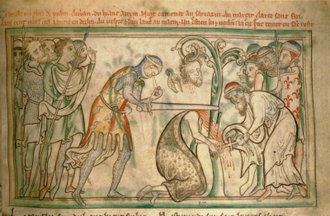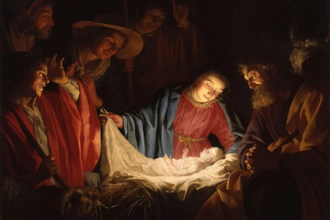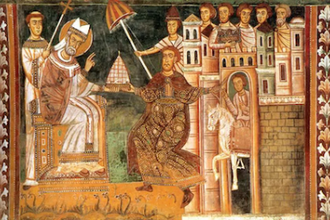Gospel in Art: Saint Alban, First Martyr of England

Sanctus Albanus decapitatus, 1250 manuscript The Life of St. Alban © Trinity College, Dublin
Source: Christian Art
Gospel of 20 June 2024
Matthew 6:7-15
Jesus said to his disciples: 'In your prayers do not babble as the pagans do, for they think that by using many words they will make themselves heard. Do not be like them; your Father knows what you need before you ask him. So you should pray like this:
'Our Father in heaven, may your name be held holy, your kingdom come, your will be done, on earth as in heaven.
Give us today our daily bread. And forgive us our debts, as we have forgiven those who are in debt to us. And do not put us to the test, but save us from the evil one.
'Yes, if you forgive others their failings, your heavenly Father will forgive you yours; but if you do not forgive others, your Father will not forgive your failings either.'
Reflection on the manuscript page
Saint Alban is venerated as the first-recorded British Christian martyr and, therefore, as the British protomartyr. Along with fellow Saints Julius and Aaron, Alban is one of three named martyrs recorded at an early date from Roman Britain. He is believed to have lived during the late 3rd or early 4th century in the Roman city of Verulamium, which is modern-day St Albans, Hertfordshire. Alban was a pagan Roman soldier who converted to Christianity. The pivotal moment in his life came when he sheltered a Christian priest, known as Amphibalus, who was fleeing persecution. Deeply moved by the priest's faith and piety, Alban converted to Christianity and was baptised. When Roman soldiers came searching for the priest, Alban exchanged clothes with him to allow the priest to escape. As a result, Alban was arrested and brought before the Roman authorities. Despite being threatened, he refused to renounce his new faith. Alban was sentenced to death. As he was led to his execution, various miracles were reported, such as the drying up of a river to allow him to cross. At the execution site, a miraculous spring of water appeared, and the executioner's eyes reportedly fell out after he executed Alban. He was beheaded on what is now known as Holywell Hill, around AD 250.
This is the scene being depicting in our manuscript of circa 1250 AD. As the beheading takes place, the dove of the Holy Spirit is flying off, the soldier's eyes are popping out and the head is hanging on a tree. In legends, after his execution Alban's head rolled downhill and hung from a tree; below the head a well sprang up. Upon hearing of the miracles, the astonished judge ordered further persecutions to cease and he began to honour the saint's death. St Albans Cathedral now stands near the believed site of his execution on Holywell Hill and there is a well at the bottom of the hill.
The earliest mention of Alban's martyrdom is believed to be in Victricius's De Laude Sanctorum (The Praise of Saints), circa 396. Victricius had just returned from settling a dispute among the bishops of Britain. He does not mention Alban by name but includes an unnamed martyr, who, "in the hands of the executioners told rivers to draw back, lest he should be delayed in his haste." Saint Bede then gives a much fuller account in his Ecclesiastical History of the English People, circa 730 AD.
Saint Alban. Pray for us.
LINKS
Gospel in Art: https://christian.art/
Today's Reflection: https://christian.art/daily-gospel-reading/matthew-6-7-15-2024/


















